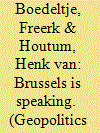|
|
|
Sort Order |
|
|
|
Items / Page
|
|
|
|
|
|
|
| Srl | Item |
| 1 |
ID:
103739


|
|
|
|
|
| Publication |
2011.
|
| Summary/Abstract |
The European Neighbourhood Policy (ENP) was presented as the EU's strategic response in order to deal with the new situation following the enlargement of the European Union in 2004. According to the EU, these changing circumstances have led to new rationales: 1) coping with its new external borders and neighbours and 2), finding a solution for a further enlargement problem. Both rationales are drawn out of strategic interest avoiding potentially damaging consequences on stability and development. Moreover, new inducements for multilevel cooperation were seen as necessary in order to 'include' the neighbouring states and create a prosperous and stable 'Ring of friends'. The ENP has the objective to contribute to internal transformation and to further the process of 'Europeanisation'. Europeanisation is explained by the EU as a normative process of sharing European values made concrete through policies of conditionality and socialisation of neighbouring states. This process of expanding 'Europeanisation' beyond the EU borders is inspired by an ambiguous and conflicting geopolitics that the EU applies as a strategic instrument. Most notably, this is emphasised by the fact that the ENP on the one hand creates an image of an inferior neighbour that urgently needs to move towards European standards and on the other hand produces a speech politics of mutuality and dialogue.
Through the study of EU speeches, communications and documents, we will argue that the rationales behind the ENP suggest a closure of the European Union and allow for neo-colonial interpretations by which pre-defined policies are to be accepted and pre-defined European values are seen as superior to neighbouring local values. This development is both undesirable and harmful. Europe is increasingly re-created as a bounded political entity institutionalised through hierarchical treaties and acts with friends, special friends, and reluctant, unwilling neighbours. In doing so, the EU faces a significant chance of alienating its neighbours and damaging cultures and societies by asymmetrical imperial power-policies based on self-created values. Paradoxically then, ENP that was set up to create good neighbours, risks producing what it wishes to protect from, angry neighbours.
|
|
|
|
|
|
|
|
|
|
|
|
|
|
|
|
| 2 |
ID:
067318


|
|
|
| 3 |
ID:
103737


|
|
|
| 4 |
ID:
117438


|
|
|
|
|
| Publication |
2012.
|
| Summary/Abstract |
It is almost a truism to say that people increasingly dwell in a transnational context, that is, in-between societal systems and together with multiple nationalities. Increasingly, people are living in a different nation in which they were born. The nation-states people dwell in cannot be equated with territorial container-boxes anymore, if this ever could. The uniform and straight lines in the sand, that borders once were thought to be, are now better understood as a complex choreography of border lines in multiplied lived spaces. This article zooms in on a specific kind of dwelling with multiple borders. It tries to get a conceptual hold of contemporary dwelling places of short-distance migrants across a EU inner border, in this case the Dutch-German border. In recent years, much facilitated by EU cross-border cohesion policies, a substantial number of Dutch people have bought or built a house just across the border in Germany. This has created an interesting new phenomenon of cross-border dwelling, in which the new location of the house is just across the border and the living largely still goes on in the country of origin. This living in two nations at the same time at such a short distance is what we wish to understand better conceptually in this article. We argue that two fundamentally opposed philosophical dwelling conceptualisations could be distinguished. On the one hand one could distinguish a philosophical view in which dwelling is a form of a Heideggerian nest, where people open a space of being, an intimate and secure bordered place, sheltering themselves for the outside world. On the other hand then, a philosophical view could be distinguished in which dwelling is driven by a Deleuzian need to free oneself from a binding b/order of home, through a constant be-coming and estrangement, hence by constantly othering oneself. We argue that in order to understand the borderscape dwellings of Dutch migrants in German borderlands, there is a need to relate these two ends of the dwelling continuum. The argument that we bring forward is that a borderline necessarily moves between total (self-)imprisonment and total escapist openness, making borders in an ontological sense intrinsicially and unavoidably always a shifting line in the sand. In our view, Peter Sloterdijk's imaginative Sphären (Spheres) trilogy could help as a conceptual stimulus to create that much needed bridge between the bordering efforts of nesting and the debordering desire to escape from it. Using Sloterdijk's spherical concepts, the dwelling can be seen as a place which is constantly changing from a secure bubble-like place into a multidimensional foam-like place and back again. With this spherical understanding of the house we argue that this conceptual 'spheric' stimulus could help to rethink the complex and ambivalent character of cross-border dwelling places in an increasingly transnational world.
|
|
|
|
|
|
|
|
|
|
|
|
|
|
|
|
|
|
|
|
|